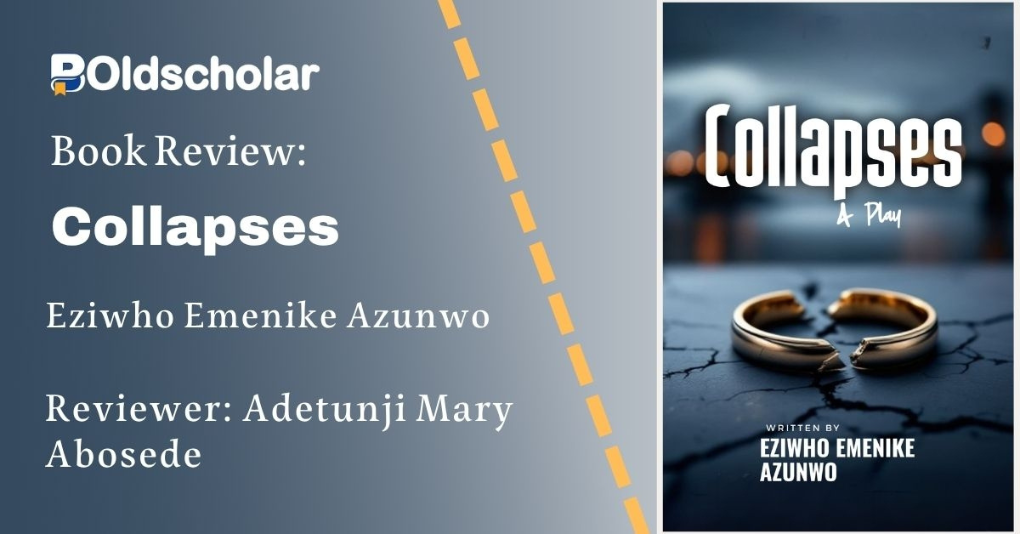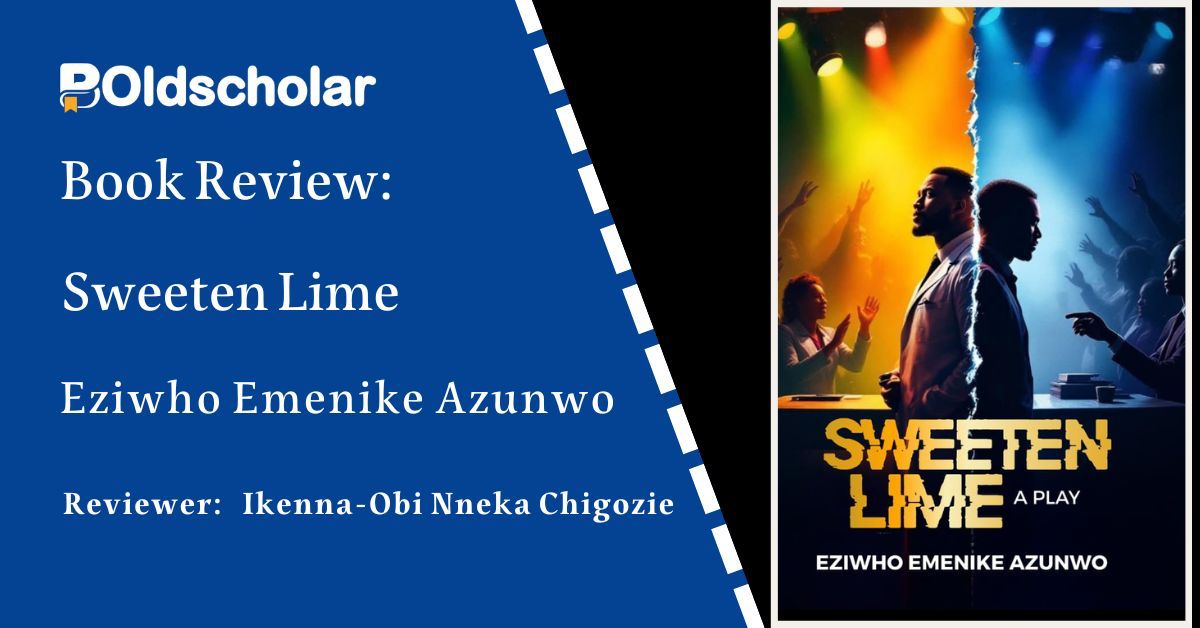Genre: Drama
Author: Eziwho Emenike Azunwo
Reviewer: Adetunji Mary Abosede
Edited and Published in Nigeria by: Covenant Daystar Publishers
Pagination (number of pages) 70 pages
Year of Publication: 2025
Institution: Rivers State University, Port Harcourt Department of Theatre and Film studies.
INTRODUCTION
Eziwho Emenike Azunwo’s Collapses: A dramatic play with a powerful work that considers, within contemporary African relationships, the intersection of modernity, love, social expectations, and values. The failed engagement of Akim and Fumi untangles in Azunwo's exploration of it. He explores how ego, materialism, and individualistic pursuits test for, and break, the fragility of romantic ideals. Customary values' erosion in courtship and marriage get critiqued by the play as it notes consumerist ideologies, gender dynamics, and generational dissonance's implications. Since it is one with a deep emotional resonance, the author is framing personal choices within communal contexts, while examining how private failures often result in collective consequences. Because it looks at its structure, characters, language, themes, and cultural relevance within African and global theatrical traditions, this review assesses Collapses as a socio-dramatic text.
PLOT OVERVIEW
Collapses is structured into six dramatic scenes that trace the disintegration of an engagement between two young lovers, Akim and Fumi. The narrative begins with growing concern from both families, especially Fumi’s parents, over the prolonged engagement that has failed to lead to marriage. Fumi’s visit home triggers a tense exchange with her father, who expresses disappointment in her reluctance to move forward in the relationship. Fumi defends herself by articulating personal standards she expects from a future husband, notably financial capability and material comfort, which she believes Akim cannot presently provide.
The subsequent scenes juxtapose Fumi’s interactions with her friends Florence and Kate with Akim’s reflective conversations with his colleague Louise and his parents. While Fumi and her peers justify their materialistic expectations as a form of modern female empowerment, Akim laments the commodification of love and questions the sustainability of a relationship built on entitlement rather than mutual respect. Eventually, Akim confronts Fumi and ends the engagement after she lists a set of self- serving conditions for marriage. The emotional collapse culminates in Fumi being expelled from her family home, symbolizing the complete breakdown of her social and familial support system.
THEMATIC ANALYSIS
- Love Versus Materialism
At the heart of Collapses lies a critical interrogation of what sustains romantic relationships in contemporary society. The playwright problematizes the belief that love alone is sufficient, revealing how material desires and unrealistic expectations can undermine genuine affection. Fumi’s insistence on being “spoiled” and “treated like a queen” reflects a shift in how love is negotiated in modern relationships, where financial provision is often equated with emotional investment. Akim, initially committed, becomes disillusioned as he recognizes that Fumi’s loyalty is conditional upon his ability to meet her material demands.
This thematic thread critiques the commercialization of intimacy and draws attention to the fragility of engagements that are not rooted in shared values. Azunwo underscores the dangers of commodifying love and presents a sobering reminder that relationships anchored in consumerist ideologies are susceptible to collapse when financial expectations remain unmet.
- Parental Expectations and Generational Conflict
The tension between traditional parental expectations and modern romantic ideals is poignantly dramatized in the play. Mr. Adewomi and Mr. Olu, representing the older generation, are portrayed as upholders of customary values, marriage, family, and communal responsibility. Their frustration over their children delayed marital commitments reflects a generational divide exacerbated by shifting socio-economic realities. Akim’s father offers a moral critique of contemporary courtship practices, recalling a time when love was expressed through perseverance and partnership, not ostentation and entitlement.
This generational conflict illustrates a broader cultural dialogue occurring in many African societies: how to reconcile evolving individual freedoms with enduring communal obligations. The parents’ interventions, although harsh, stem from a desire to preserve the sanctity of marriage, reflecting a collective anxiety over the decline of marital stability in modern life.
- Female Empowerment and Misinterpretation
While Collapses critiques Fumi’s materialism, it also opens a necessary conversation about female empowerment, economic independence, and gender roles. Fumi and her friends articulate a version of womanhood that prioritizes self-worth, dignity, and non-submissiveness. They reject the notion of enduring suffering in marriage, a reality that many African women of earlier generations silently bore. This defiance, however, is portrayed as misguided when it becomes entangled with entitlement, selfishness, and arrogance.
Azunwo subtly challenges the conflation of empowerment with consumerism, suggesting that true liberation must be balanced with emotional intelligence, humility, and mutual respect.
While Fumi’s assertions about deserved care are valid, her lack of compromise and insensitivity towards Akim’s reality render her empowerment superficial. The play thus prompts a nuanced examination of what constitutes authentic female empowerment in relationships.
- Collapse of Communication
The titular motif of “collapse” extends beyond the romantic relationship to encompass communication, understanding, and social cohesion. Throughout the play, communication between characters is fraught with tension, misunderstanding, and emotional detachment. Fumi’s interactions with her parents and Akim are laced with defensiveness, while Akim’s failure to express his feelings early enough allows resentment to fester. These communication breakdowns contribute to the irreparable damage in the engagement, suggesting that relational collapse often begins with conversational disconnect.
CHARACTERIZATION
The play's effectiveness relies heavily on Azunwo’s deft characterization.
Each character functions as a symbolic representation of broader societal archetypes:
- Akim is portrayed as a thoughtful, disciplined, and emotionally wounded young man, navigating the contradictions of love and personal integrity. His decision to end the engagement, though painful, is framed as a courageous assertion of dignity.
- Fumi, on the other hand, is a complex character whose ambition and self- assuredness are tainted by selfishness and emotional immaturity. Her fall from grace becomes a cautionary tale about the dangers of pride and misaligned priorities.
- Mr. and Mrs. Adewomi embody the old guard, emotionally invested in their daughter’s future, but often communicating their concern through authoritarian rather than empathetic means.
- Louise, Florence, and Kate serve as mirrors and foils, amplifying the ideological
tensions that drive the play’s central conflict. Through them, Azunwo explores peer influence, urban modernity, and the normalization of transactional relationships among youth.
- Azunwo’s strength lies in his ability to create characters that are both dramatically compelling and thematically loaded, each advancing the moral arc of the play while remaining grounded in recognizable human behavior.
STRUCTURE AND LANGUAGE
Structurally, Collapses is divided into six scenes that follow a classical dramatic arc— exposition, rising tension, climax, and resolution. This structure enables the gradual unraveling of the relationship while building emotional intensity. Azunwo employs a dialogic style that captures the rhythm and inflection of Nigerian English and indigenous expressions. The code-switching between English and Yoruba adds authenticity and cultural depth, while also reinforcing themes of identity and generational belonging.
The language is accessible and emotionally charged, revealing inner conflicts and societal pressures through sharp exchanges. While some moments veer into didacticism, the overall effect is one of realism and relatability. The dialogue between Akim and his parents, for example, is poignant in its simplicity, delivering profound wisdom without ornamental language. Likewise, Fumi’s monologues capture the bravado and vulnerability of a woman torn between self-assertion and social expectations.
CULTURAL AND SOCIAL RELEVANCE
Collapses is deeply rooted in the socio-cultural realities of contemporary Nigerian life. The play reflects ongoing debates around the institution of marriage, especially among the educated middle class. It challenges the growing trend of delayed marriages and the shifting meaning of commitment in a society where traditional values increasingly clash with Westernized individualism.
In doing so, Azunwo positions Collapses within the tradition of social realism in African drama, akin to the works of Ola Rotimi, Tess Onwueme, and Femi Osofisan. Like these predecessors, Azunwo uses the stage as a space for critical reflection and communal conversation, advocating for a return to relational ethics grounded in mutual respect and collective well-being.
Furthermore, the play contributes to feminist discourse by illustrating the complexities of modern womanhood. It resists simplistic moral binaries, offering instead a textured portrayal of a woman’s pursuit of autonomy gone awry. Fumi is neither a villain nor victim, but a symbol of a generation caught between tradition and transformation.
STRENGTHS AND LIMITATIONS
The greatest strength of Collapses lies in its thematic richness and emotional resonance. It successfully transforms a domestic conflict into a broader socio-cultural critique. Its characters are relatable, and its dialogue is vibrant and grounded in everyday reality. The narrative is tightly woven, and its emotional climax—Akim returning the ring—is both cathartic and symbolic.
However, one limitation is that the play, at times, appears overly moralistic. The author’s position is clear, and while this strengthens the clarity of the message, it leaves little room for ambiguity or alternate interpretations. Fumi’s character could have benefited from more psychological nuance; her evolution from confident partner to disgraced daughter happens swiftly and leaves readers questioning whether her downfall is entirely proportionate.
Additionally, while the play effectively represents male perspectives on relationship struggles, it could have deepened its engagement with Fumi’s inner world beyond her material expectations. A more balanced interrogation of both partners’ flaws might have yielded a more layered dramatic experience.
CONCLUSION
Eziwho Emenike Azunwo’s Collapses is a compelling and thought-provoking play that interrogates the ideals and illusions of modern relationships. It provides a searing critique of materialism, entitlement, and emotional immaturity, while also defending the enduring value of respect, selflessness, and communication in building lasting unions.
By anchoring personal narratives within larger social contexts, the play speaks to audiences across generations and geographies.
As both a cautionary tale and a social mirror, Collapses challenges readers to reconsider what truly sustains love and partnership in a changing world. It is a work of cultural significance and literary merit that deserves wide readership, especially among young adults navigating the complexities of love, identity, and responsibility in an increasingly commodified world.
Share this post





Be the first to comment on this post